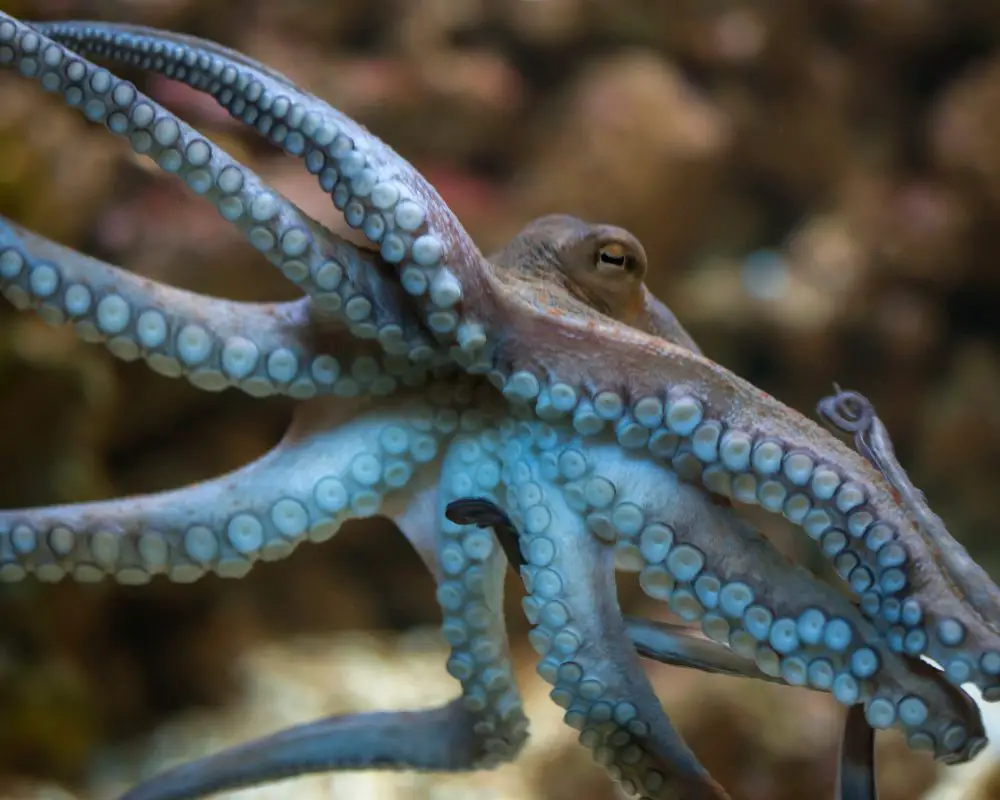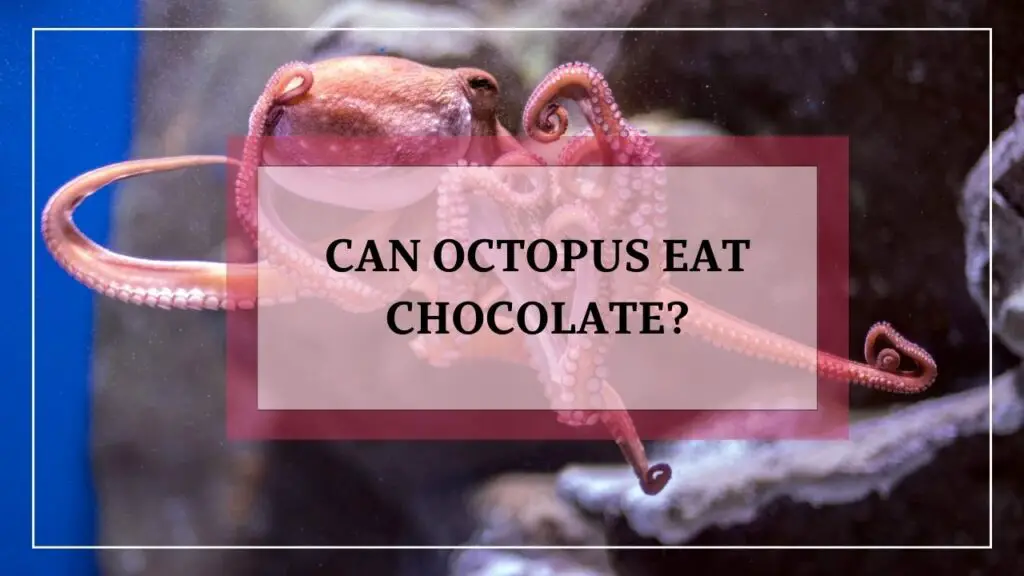Have you ever wondered if octopuses can eat chocolate? Well, it’s a fascinating question that we’re going to uncover together!
Octopuses are incredible creatures that live in the ocean. They have long tentacles, big eyes, and are super smart. Just like humans, they need to eat to stay healthy and strong. But when it comes to food, not everything is safe for them to munch on.
So, let’s get straight to the point! Can octopuses eat chocolate? The answer is no, they cannot. While we humans may enjoy a tasty chocolate treat, it’s actually not good for our eight-armed friends. Chocolate contains a substance called theobromine, which can be harmful to octopuses and other animals. Just like how you shouldn’t eat certain foods that are bad for you, octopuses should avoid chocolate too.
Now, let’s dig deeper into why chocolate is a no-no for octopuses:
The Toxicity of Chocolate on Octopuses

Now that we know octopuses can’t enjoy chocolate as we do, let’s dive into why that is. Chocolate may be delicious for us humans, but for our eight-armed pals, it can be quite dangerous. Here’s why:
Theobromine And Its Sneaky Effects
You see, chocolate contains a substance called theobromine (pronounced: thee-oh-broh-meen). It’s found in varying amounts depending on the type of chocolate, like milk chocolate or dark chocolate. Now, theobromine might sound like a fancy word, but its effects can be pretty serious.
When animals, including octopuses, consume theobromine, it can mess with their nervous system. Imagine Theobromine as a mischievous joker playing pranks on the octopus’s body. It can make their nerves all jittery and hyperactive. Just like when you have too much sugar and can’t sit still, theobromine does the same to poor octopuses!
The Heartbreak Of Caffeine
But wait, there’s more! Chocolate also contains caffeine, another troublemaker for octopuses. Caffeine is like a little energy boost that can make you feel awake and alert. However, when octopuses consume caffeine, it can speed up their heart rate and cause problems with their cardiovascular system. Think of it like having too many cups of coffee and feeling your heart race.
Octopuses And Their Sensitivity
Now, you might wonder why octopuses are particularly sensitive to these chemicals. Well, it all comes down to their incredible nervous system. Octopuses have a complex network of nerves that allow them to do amazing things, like changing color and shape, and even solving puzzles! But this complexity also makes them more vulnerable to certain substances, like theobromine and caffeine.
So, while we humans might enjoy our chocolatey delights, it’s essential to remember that octopuses have different dietary needs and sensitivities. Let’s keep the chocolate for ourselves and explore safer and more exciting food options for our tentacled buddies.
Theobromine and Octopuses
Now, let’s take a closer look at that mischievous compound known as theobromine. It’s found in chocolate and can have quite an effect on both humans and octopuses. Prepare to be amazed!
You’re enjoying a scrumptious chocolate bar, savoring its rich flavor. Little do you know, inside that delectable treat lurks theobromine, a sneaky stimulant. Theobromine is like a party starter in your nervous system, giving it a little kick!
When octopuses consume theobromine, it sets off a series of events in their body. It stimulates their nerves, making them hyperactive and jittery. It’s like giving octopuses a shot of espresso but without the fun of sipping it from a fancy cup!
The Risks Of Theobromine For Octopuses
Now, let’s talk about the potential risks of theobromine ingestion for our underwater friends. Since octopuses have a different physiology than humans, theobromine affects them in unique ways. While we might experience a pleasant buzz from chocolate, octopuses can face some serious health issues.
If an octopus consumes chocolate, the theobromine can overwhelm its sensitive nervous system. This can lead to a variety of problems, such as erratic behavior, seizures, and even heart irregularities. Just like humans have to be careful about what we eat, octopuses must avoid theobromine-rich foods for their own well-being.
Metabolism Matters: Humans Vs. Marine Animals
Now, here’s where things get interesting. Humans and marine animals, like octopuses, have different metabolisms and tolerances when it comes to theobromine. Metabolism is a set of chemical reactions happening in our bodies that help break down and process substances.
Humans have a fairly efficient metabolism for theobromine, which means we can process it relatively well. But for octopuses, it’s a different story. Their bodies aren’t equipped to handle theobromine as we can. Theobromine sticks around in their system for longer, causing more trouble and mischief.
Caffeine and Octopuses
Did you know that chocolate contains caffeine too? That’s right! Just like a morning cup of joe, chocolate can give us a little energy boost. But when it comes to our eight-armed pals, caffeine can cause some serious trouble.[1]
When octopuses consume caffeine, it can have a direct impact on their cardiovascular system. Think of it like an unexpected roller coaster ride for their hearts. Caffeine can make their heart rate go up, like when you’re feeling excited or anxious. But for octopuses, an increased heart rate can lead to potential cardiac issues. And we definitely don’t want that!
Risks Of Caffeine For Octopuses
Now, let’s talk about the potential risks of caffeine consumption for our underwater buddies. Octopuses, with their unique physiology, are more vulnerable to the effects of caffeine compared to humans. Caffeine can disrupt their delicate heart rhythms and put extra strain on their cardiovascular system.
Imagine trying to run a marathon without training. It would put a lot of stress on your body, right? Well, that’s similar to what happens when octopuses consume caffeine. It can make their hearts work harder and potentially lead to cardiac problems. Just like how we avoid things that can harm our health, octopuses should steer clear of caffeine-rich substances.
Say No To Caffeine For Marine Animals
It’s essential to understand that marine animals, including octopuses, have specific dietary needs that differ from ours. While we humans may enjoy our cup of coffee or chocolatey treats, it’s crucial to keep these caffeine-rich substances away from our marine friends.
As responsible stewards of the ocean, we need to prioritize the well-being of marine life. That means avoiding any substances, like caffeine, that can have negative effects on their health. Instead, let’s focus on providing them with a safe and natural environment that supports their unique nutritional requirements.
Conclusion
In conclusion, we’ve uncovered the truth about octopuses and their relationship with chocolate. While chocolate may be a delightful treat for us, it can be harmful to our octopus friends due to theobromine and caffeine. These substances can have negative effects on their nervous and cardiovascular systems. It’s crucial to prioritize the well-being of marine animals by avoiding caffeine-rich substances and providing them with a safe and natural diet.

